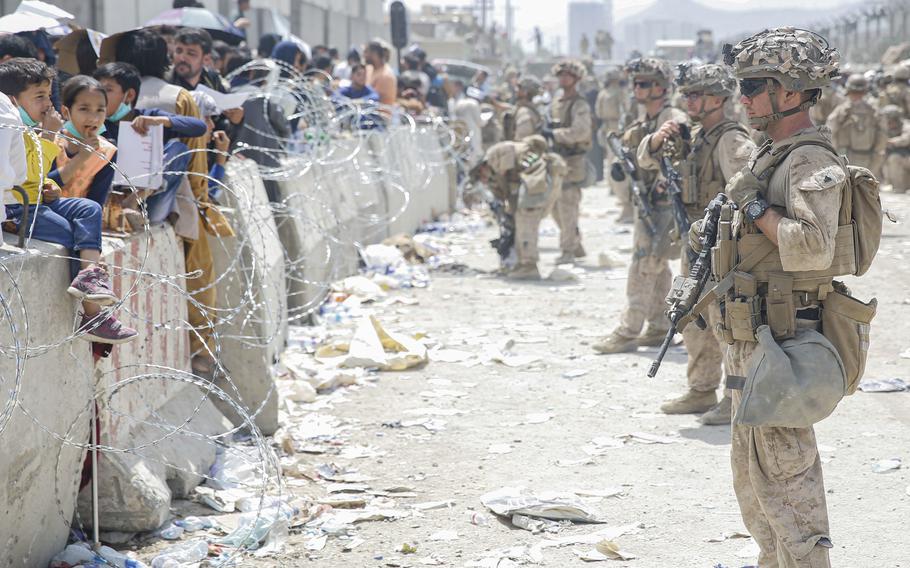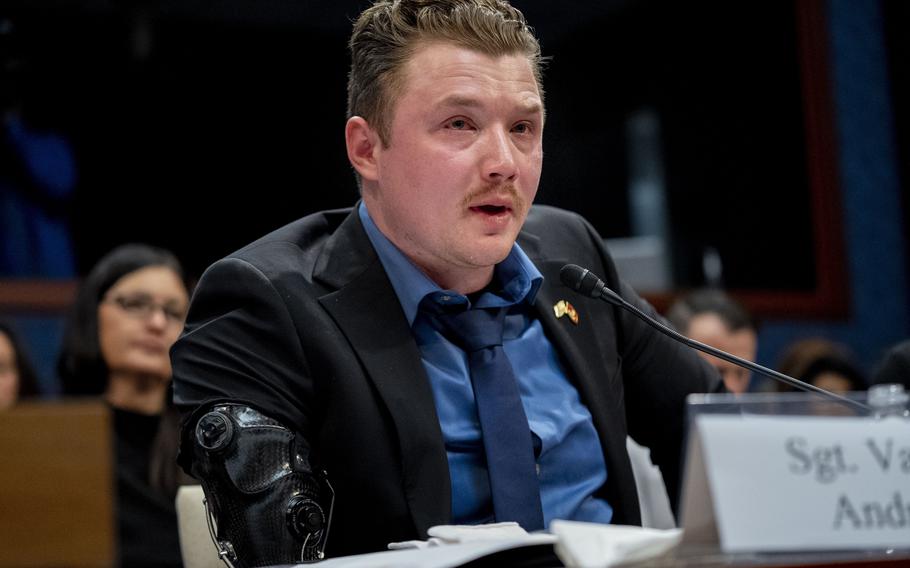
U.S. Marines provide assistance during an evacuation at Hamid Karzai International Airport in Kabul, Afghanistan, on Aug. 20, 2021. (Nicholas Guevara/U.S. Marine Corps)
WASHINGTON — A Marine injured in a suicide attack during the U.S. withdrawal from Afghanistan in 2021 choked up as he told House lawmakers on Wednesday that he had spotted the suspected bomber hours before the blast.
Sgt. Tyler Vargas-Andrews, 25, said his unit had warned commanders that they saw two suspects in the chaotic crowd outside Kabul’s Hamid Karzai International Airport on Aug. 26, 2021, that fit a description flagged by U.S. intelligence, but the Marines were denied permission to shoot.
“Plain and simple, we were ignored,” Vargas-Andrews said.
The ensuing explosion at the airport’s Abbey Gate killed 13 U.S. troops and about 170 civilians and wounded 45 service members. Vargas-Andrews lost an arm, leg and kidney as a result of the attack and has since undergone 44 surgeries.
His emotional testimony before the House Foreign Affairs Committee on Wednesday was part of a revived effort by Republicans since taking control of the House in January to examine the tumultuous end of the 20-year war in Afghanistan.
“What happened in Afghanistan was a systemic breakdown of the federal government at every level and a stunning failure of leadership by the Biden administration,” said Rep. Michael McCaul, R-Texas, the committee chairman. “I will not rest and this committee will not rest until we determine how this happened and hold those responsible for it accountable.”

Marine veteran Sgt. Tyler Vargas-Andrews, who was gravely injured, losing an arm and a leg in a suicide attack at Hamid Karzai International Airport in Kabul, becomes emotional as he recounts his story during a House Committee on Foreign Affairs hearing on the United States evacuation from Afghanistan on Capitol Hill in Washington, Wednesday, March 8, 2023. (Andrew Harnik/AP)
McCaul said “our game plan” was to ultimately bring Defense Secretary Lloyd Austin, Secretary of State Antony Blinken and Army Gen. Mark Milley, the chairman of the Joint Chiefs of Staff, to Capitol Hill for further scrutiny.
Vargas-Andrews cried several times as he recounted the days and hours before the deadly suicide attack. He described the desperate attempts of exhausted and dehydrated Afghans to reach evacuation planes as the Taliban killed and brutalized them in full view of U.S. service members. Troops were not allowed to engage, he said.
“We were just helpless,” Vargas-Andrews said. “We passed over intel, let people know what was going on but [we were] unable to do anything.”
Vargas-Andrews, a gunman and radio operator, belonged to a scout sniper team and was tasked with scanning and controlling the crowd and helping the State Department process evacuees.
He said an intelligence bulletin went out at 2 a.m. on the day of the suicide attack describing a potential bomber and his male companion. Vargas-Andrews said he and others saw the individuals, “nervously looking up at our position,” between noon and 1 p.m. When Marines relayed their findings to a commander and asked for permission to shoot, the commander said he did not have the authority to approve such an action, he said.
“We asked who did and [the commander] said he didn’t know and would find out,” Vargas-Andrews said. “In that time, the two individuals disappeared into the crowd.”
The Marine and veterans who testified Wednesday expressed frustration with a lack of accountability for the haphazard withdrawal and deep regret for the thousands of Afghan allies who were left behind.
Vargas-Andrews said no one from the military or any other government agency had interviewed him about his experiences at the Kabul airport. He said he feels his service “is not valued to this country by the government.”
Aidan Gunderson, a former Army specialist with the 82nd Airborne Division, described the withdrawal as an “organizational failure at multiple levels.” He said the two weeks that he spent on the ground in Kabul after the city fell to the Taliban were harrowing. Scenes of mothers carrying dead babies and the smell of feces and urine in the airport’s corridors continue to stay with him, he said.
And he remains plagued by the faces of all the people the U.S. military could not save.
“Departing on Aug. 31 on one of the last flights out of the country, I was relieved to be headed home, but I wondered how the horror I just witnessed had just changed me — how it would change us all,” Gunderson said. “I can assure that it has. This war is not over for millions of people in Afghanistan and the U.S.”
David Scott Mann, a retired Green Beret who served three combat tours in Afghanistan, warned lawmakers of a swelling “mental health tsunami.” He said a moral injury had been heaped on veterans and their family members, who are now wondering whether their service had a purpose. More than 800,000 U.S. troops served in Afghanistan and nearly 2,500 were killed.
“The fact of the matter is the only way to move from a moral injury to moral recovery is for leaders to step forward, first and foremost, and take responsibility for what happened,” Mann said. “I think yes, it starts with the commander in chief, but it needs to go all the way down to our retired admirals and generals and sergeants major, all of them. We're going to have to really lean into this mental health issue. It’s going to take all leaders at all levels to acknowledge that this thing was a serious mistake, and it can never happen again.”
Mann founded Task Force Pineapple, a volunteer group of U.S. veterans, to help rescue an Afghan commando, his family and more than 1,000 other refugees as the Taliban took over Afghanistan. He said America has been building a reputation of abandonment, leaving “smoldering, human wreckage” from Vietnam to Syria.
Veterans pressed lawmakers on Wednesday to continue efforts to get an estimated 200,000 remaining Afghan allies and partners out of Afghanistan. Camille Mackler, executive director of the legal advocacy group Immigrant Advocates Response Collaborative, urged members of Congress to improve the immigration process and pass the Afghan Adjustment Act. The bill would provide a path to permanent residency to tens of thousands of evacuated Afghans.
Rep. Gregory Meeks of New York, the top Democrat on the foreign affairs panel, placed much of the blame for immigration backlogs and the disordered evacuation on visa program caps, staffing cuts and other policy decisions initiated by former President Donald Trump’s administration. Democrats on Wednesday pointed out President Joe Biden had inherited a lousy deal that Trump had made with the Taliban to withdraw U.S. forces from Afghanistan by May 2021.
“Yes, what happened in August was messy and violent and something to be avoided at all costs,” said Rep. Gerry Connolly, D-Va. “But it had a history and there was a context and there were previous decisions made that led to that tragedy and to try to now make this a partisan advantage cheapens the experience of so many who gave so much.”
Vargas-Andrews said there was one moment from the evacuation that has defined his service in the Marine Corps.
He fondly recalled how a young Afghan girl squeezed through the crowd at Abbey Gate with her two younger siblings and went up to Vargas-Andrews for help. The girl’s dirt-stained face was streaked with tears as she cried for her father, Vargas-Andrews said. She held a baby whose skin had turned blue and the hand of her little brother.
Vargas-Andrews said he got medical aid for the baby and after lifting the girl to survey the throngs of people, reunited her with her father. The family was among the 120,000 people airlifted out of Kabul.
“For me, that was a moment that [made] my personal injury … worth it,” Vargas-Andrews said. “I know those three little kids will have a life of freedom and opportunity now because of that.”